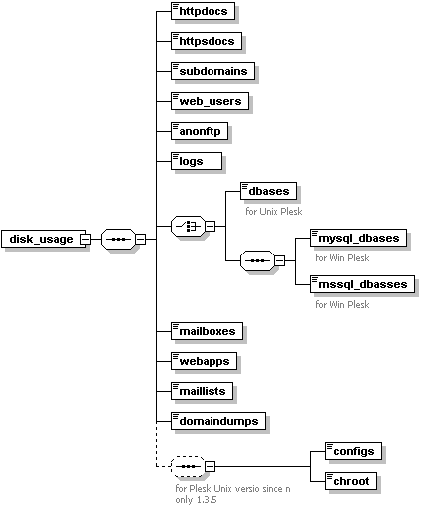Disk Space Usage Settings
Disk usage settings restrict the amount of disk space set for various entities (logs, folders, databases, etc.) within a subscription.
To get these settings from Plesk database, send the get packet and
receive the response. The returned disk_usage node has no data type,
it is nested within the data node (described in
plesk_domain.xsd) and has the following structure.

- The httpdocs node is required. Specifies the amount of disk
space (in bytes) occupied by the
/httpdocsdirectory. Data type: long. - The httpsdocs node is required. Specifies the amount of disk
space (in bytes) occupied by the
/httpsdocsdirectory. Data type: long. - The subdomains node is required. Specifies the amount of disk space (in bytes) occupied by subdomains on this subscription. Data type: long.
- The web_users node is required. Specifies the amount of disk space (in bytes) allotted for web users on the subscription. Data type: long.
- The anonftp node is required. Specifies the amount of disk space (in bytes) occupied by anonymous FTP. Data type: long.
- The logs node is required. Specifies the amount of disk space (in bytes) occupied by logs. Data type: long.
- The dbases node is required. Specifies the amount of disk space (in bytes) occupied by databases created. Data type: long. Makes sense for Plesk for UNIX only.
- The mysql_dbases node is required. Specifies the amount of disk space (in bytes) occupied by MySQL databases created. Data type: integer. Makes sense for Plesk for Windows only.
- The mssql_dbases node is required. Specifies the amount of disk space (in bytes) occupied by MSSQL databases created. Data type: integer. Makes sense for Plesk for Windows only.
- The mailboxes node is required. Specifies the amount of disk space (in bytes) allotted by mailboxes. Data type: long.
- The webapps node is required. Specifies the amount of disk space (in bytes) occupied by Tomcat web applications deployed. Data type: long.
- The maillists node is required. Specifies the amount of disk space (in bytes) occupied by mailing lists. Data type: long.
- The domaindumps node is required. Specifies the amount of disk space (in bytes) occupied by dumps. Data type: long.
- The configs node is required. Specifies the amount of disk space (in bytes) occupied by configuration files. Data type: long. Makes sense for Plesk for UNIX only.
- The chroot node is required. Specifies the amount of disk space (in bytes) occupied by the /chroot directory. Data type: long. Makes sense for Plesk for UNIX only.
Most of these settings cannot be set up directly. You can set only two of them: mailboxes and maillists. The disk_usage node of the set request packet does not have its own data type and is structured as follows:

- The mailboxes node is optional. Specifies the amount of disk space (in bytes) allotted by mailboxes per subscription. Data type: long.
- The maillists node is optional. Specifies the amount of disk space (in bytes) occupied by mailing lists created per subscription. Data type: long.
The following set request packet sets the limits on the hard disk space for email boxes and mailing lists:
<packet>
<webspace>
<set>
<filter>
<id>123</id>
<id>124</id>
</filter>
<values>
<disk_usage>
<mailboxes>1073741824</mailboxes>
<maillists>1048576</maillists>
</disk_usage>
</values>
</set>
</webspace>
</packet>
The following get response packet returns the disk usage information for the specified subscription:
<packet>
<webspace>
<get>
<result>
<status>ok</status>
<filter-id>2435</filter-id>
<id>2435</id>
<data>
<disk_usage>
<httpdocs>2097152</httpdocs>
<httpsdocs>1572864</httpsdocs>
<subdomains>12582945</subdomains>
<web_users>130023456</web_users>
<anonftp>12582975</anonftp>
<logs>4194312</logs>
<dbases>4194325</dbases>
<mailboxes>12582978</mailboxes>
<webapps>3145728</webapps>
<maillists>1048523</maillists>
<domaindumps>209715200</domaindumps>
<configs>25078</configs>
<chroot>2095647</chroot>
</disk_usage>
</data>
</result>
</get>
</webspace>
</packet>